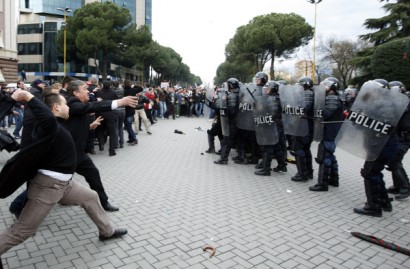 Social organization is understood to be any group of people that is established from shared elements, common ideas, similar ways of seeing the world.
Social organization is understood to be any group of people that is established from shared elements, common ideas, similar ways of seeing the world.
In addition, it is important for such a group of people to be considered a social organization that there is an objective to be achieved, be it solidarity or private. This is so since a social organization must always exist for a reason and not for spontaneous causal variables (in which case we would not be talking about social organizations but rather about common expressions of certain social groups).
Social organizations exist from the moment in which the human being began to live in society
Although this is a very fashionable and current term, social organizations can take many different forms and have been throughout time. One of the main characteristics that a social organization must have is to have a group of people who share elements in common, similar interests, similar values or ways of acting in certain situations. At the same time, social organizations are always established with a purpose, for example to change the reality that surrounds their members, to provide discussions on certain topics or simply to share a specific moment.
In the same way that societies and human institutions are complex, social organizations can also become highly complex and even conflictive. To avoid this, they must have a more or less rigid system of hierarchies that organize the different tasks, establish various functions and mark the objectives as well as the results to be achieved.
Difference between social movement, social organization and civil society
These three terms have similarities and differences and in this sense can create some confusion. A social movement is a normally large group of individuals who share ideals and who try to transform some aspect of reality. Normally these movements are very heterogeneous and are characterized by their opposition to the established power, especially to the government of a nation.
A social organization has a series of elements:
1) the individuals that form it create an entity with a shared objective and interests (for example, a cultural association or a non-profit foundation),
2) the entity acquires a specific legal form (cooperative society, collective society and others) and
3) the people who make up the entity are governed by some kind of rules (for example, bylaws).
On the other hand, the idea of civil society has two meanings: it is a type of business and it is the term to refer to the set of organizations and social movements.
The range of social organizations is a reflection of the community
A society is a heterogeneous and plural human group. The same happens with the social organizations that comprise it. Some have a purely recreational purpose, such as cultural or sports. Others have a strong solidarity component, such as NGOs. Some have an economic purpose (for example, business associations).
In many cases, social organizations focus on the defense of a group (for example, workers' unions or consumer associations).
The concept of social organization understood as a model of society
In prehistoric times, humans were already related based on common interests and ties. In this sense, they created a general structure or type of social organization, such as tribe, clan, or horde. With the passage of time, a new organizational model was imposed based on the work of some (the slaves) and the domination of others (this system is known as slavery).
In the Middle Ages, the feudal order based on social division by estates or classes was established. From the Modern Age to the present there have been various forms of social organization: colonialism, communism and capitalism.









